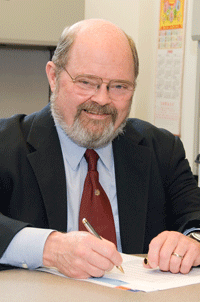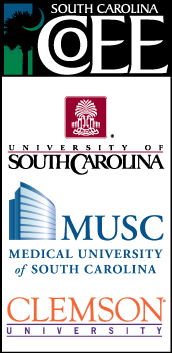USC, MUSC partnering to develop health technologies
September 29, 2009
 Steven Blair
Steven Blair
A research center dedicated to improving health, preventing illness and managing chronic health problems has been created with $3 million in start-up funding from the state’s Centers of Economic Excellence (CoEE) Program.
The Technology Center to Enhance Healthful Lifestyles is a partnership between the University of South Carolina and the Medical University of South Carolina, CoEE officials said.
Dr. Steven Blair, a professor at USC’s Arnold School, and Dr. Carolyn Jenkins, a professor at MUSC’s College of Nursing, are co-directors of the new organization.
Health Sciences South Carolina is providing a portion of the private funds to help match the state’s investment in the center. HSSC includes three of the state’s largest health care systems and its three research universities working together to improve health and economic well-being.
The center is being created in response to South Carolina’s dismal health picture. The state ranks sixth nationally in obesity and seventh in prevalence of diabetes, according to the Centers for Disease Control and Prevention.
Nationally, chronic illnesses such as type 2 diabetes, stroke, heart disease and cancer are common causes of disability and mortality. Unhealthful behaviors such as sedentary lifestyles and poor diets, along with the obesity that often results, are major reasons why people develop these chronic health problems.
Two world-class scientists, known as CoEE endowed chairs, will be recruited to lead the center. USC will recruit an endowed chair to focus on technology applications for changing health behavior. MUSC will recruit a chair to focus on technology applications to prevent and manage disease and reduce risk.
Once in place, the endowed chairs will work with junior researchers and students to develop new technologies such as interactive, web-based coaching programs, to help people make healthier lifestyle choices and delay or prevent chronic diseases.
Center directors believe that by developing these tools, they can improve the quality of life in South Carolina.
“We have science to back up the fact that lifestyle choices can make the difference between health and disease,” said Blair.
“For example, a large national trial demonstrated that a lifestyle program was twice as effective as medication in preventing diabetes in a high-risk population. We believe that technology-based tools can help people prevent and manage chronic conditions such as cardiovascular disease, diabetes, cancer, senile dementia, obesity, musculoskeletal problems and loss of function with aging,” he said.
The center’s work could help South Carolina’s economy in several ways, said USC President Dr. Harris Pastides.
- It could help the state become a national leader in an emerging high-growth field.
- It could result in marketable products such as new communications technologies and applications for individuals, worksites, health professionals and health systems. Products could include software and information systems for cell phones, smartphones, iPod technologies and computerized kiosks.
- It could help attract new software development, lifestyle coaching, and computer hardware companies to the state and result in start-up companies based on South Carolina discoveries. These companies could result in hundreds of new, high-paying jobs in the state in the next decade.
Along with economic benefits, the center will have indirect benefits to the state as well, said MUSC Vice President for Academic Affairs and Provost Dr. John Raymond.
“Once these new technologies are developed, there is potential that they can reduce health care costs in South Carolina and beyond. The state also could see less absenteeism in the workplace and improved productivity,” Raymond said.
Additionally, Raymond said scientists at the center could attract large amounts of funding to the state from corporations or federal agencies, which will lead to the creation of additional new jobs.
“The use of information technology within the health care industry is skyrocketing, and this center will enable South Carolina to be a part of that growth,” says CoEE Review Board Chair Paula Harper Bethea.
“With this Center of Economic Excellence, we can encourage patients in South Carolina and around the world to improve their lives by engaging in healthier lifestyle practices, while creating high-paying jobs and expanding the state’s knowledge economy.”



_01.jpg)
_02.jpg)
